SEC introduces new rule to eliminate conflicts of interest in securitizations
 SEC introduces new rule to eliminate conflicts of interest in securitizations
SEC introduces new rule to eliminate conflicts of interest in securitizations
The Securities and Exchange Commission (SEC) has adopted a new rule designed to eliminate conflicts of interest in the sale of asset-backed securities (ABS).
Rule 192 targets securitization participants and prohibits them, for a specified period of time, from engaging directly or indirectly in any transaction that could result in a material conflict of interest with investors in ABS. These activities now fall under the definition of "conflicted transactions".
The SEC's press release notes that, as required by statute, Rule 192 provides exemptions for risk-mitigating hedging activities, liquidity commitments, and bona fide market-making activities of a securitization participant. These exemptions permit certain market-making activities, subject to pre-determined conditions, that will allow securitization participants to continue important risk management, liquidity provision, and transparent market-making activities.
Rule 192 provides that conflict transactions include the short sale of eligible ABS or the purchase of a credit default swap or other credit derivative that entitles a securitization participant to receive payments upon the occurrence of specified credit events with respect to the ABS. However, a transaction that hedges only general interest rate risk or foreign currency risk does not fall within the definition of a "conflicted transaction".
Rule 192 will become effective 60 days after its publication in the Federal Register. Compliance with Rule 192 will be effective for all ABS whose first closing sale occurs 18 months after the date of publication in the Federal Register.
"I am pleased to support this rule because it fulfills Congress' mandate to address conflicts of interest in the securitization market, a market that was at the center of the 2008 financial crisis," said SEC Chairman Gary Gensler.
Gensler emphasized that such a rule will benefit investors as well as issuers and help restore confidence in the financial markets.
The SEC's recent actions show that the regulator is trying to adapt to modern financial markets and create a safer, yet sustainable, and transparent market environment.
Read more: Philippines SEC warns Binance against operating in the country without a license.













































































































































